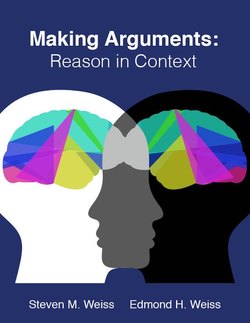Читать книгу Making Arguments: Reason in Context - Edmond H. Weiss - Страница 23
На сайте Литреса книга снята с продажи.
Responsibility II—Evidence
ОглавлениеArguing demands more than just expressing one’s own opinions. The best arguments are well supported with evidence. Evidence, anything that is produced to support a claim, can run the gamut from the very strong to the very weak. Evidence shows up in facts, expert testimony, illustrations, examples, analogies, statistics, and studies. In courtrooms there is even physical evidence, actual objects or artifacts that lead one toward an argument’s claim. (“This is the murder weapon. It belongs to the defendant. Hence the defendant is the murderer.”)
There are well-understood and widely accepted criteria for evaluating evidence, for separating the strong from the weak:
•Recency--evidence offered should be the most up to date available. The most recent evidence is not necessarily the best, but the more recent the evidence the less likely it is to be minimized or refuted in the face of something newer. An economist offers evidence that we are entering a recession, and the evidence incorporates economic data that stop three years ago. A second economist using data that is within three quarters can make a better case, especially if the more recent data disconfirms the first economist’s conclusion.
•Authority—the authority of a source has to do with its legitimacy to speak to an issue in an argument. An authority can be an institution, a person, a publication, or an organization. The authoritative nature of sources tends to disembody them. Note, however, that we often forget that the conclusions of studies, as well as what is reported in publications, is still primarily the result of an individual’s thinking or research conclusion. We often mistake an authority’s opinion for the hard data in the research.
•Public Access—it is in the nature of evidence that it be public. Every party to a dispute has the right to see it and find it. Evidence cannot be private, personal, or secret. One of the unfortunate aspects of public policy debate in a democracy is that sometimes the government keeps evidence secret, or classified. Hence the citizens’ ability to participate fully in the debate over the actions of its government is severely impaired.
•Methodological Scrutiny—it does not make sense to offer evidence unless one knows how it was acquired. If evidence is the result of an empirical study, then one ought to be familiar with how its data was collected as well as how its conclusions were inferred. An advocate cannot simply put forward the conclusions and opinions of experts. Advocates must know something about how experts reach their conclusions—including the underlying assumptions.
•Full Disclosure/Documentation—argumentation must never rely on trickery. The source for one’s evidence needs to be fully disclosed to all parties to a controversy. Advocates have a responsibility to cite and attribute sources of information, and acknowledge where they acquired their information. Given the fluid nature of electronic sourcing of evidence, it is especially important that all evidence be fully documented, and that it is retrievable in the form in which it is cited during an argument.
•Ethics—evidence needs to be used ethically, avoiding distortion, ellipsis, omission, or reading out of context. Evidence must never be fabricated, and advocates have a responsibility neither to exaggerate nor misrepresent the implications of a study, expert opinion, or publication. Often advocates, under time pressure, read only sections of published material, not realizing that the conclusions of such material may in fact contradict the general tenor of their positions. It is improper to read balanced research, for example, as one-sided.
•Relevance/Grounding—a particular misapplication of evidence is to incorporate it when it lacks germaneness to the issue. Advocates must scrutinize their evidence for true relevance to the issues being argued. Further, advocates have a responsibility to ensure that their evidence is “grounded” with respect to the issues at hand. Evidence does not exist in a vacuum, and advocates must place any evidence offered in a real context, detailed enough to evaluate its significance and relevance.
